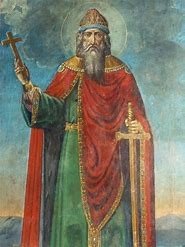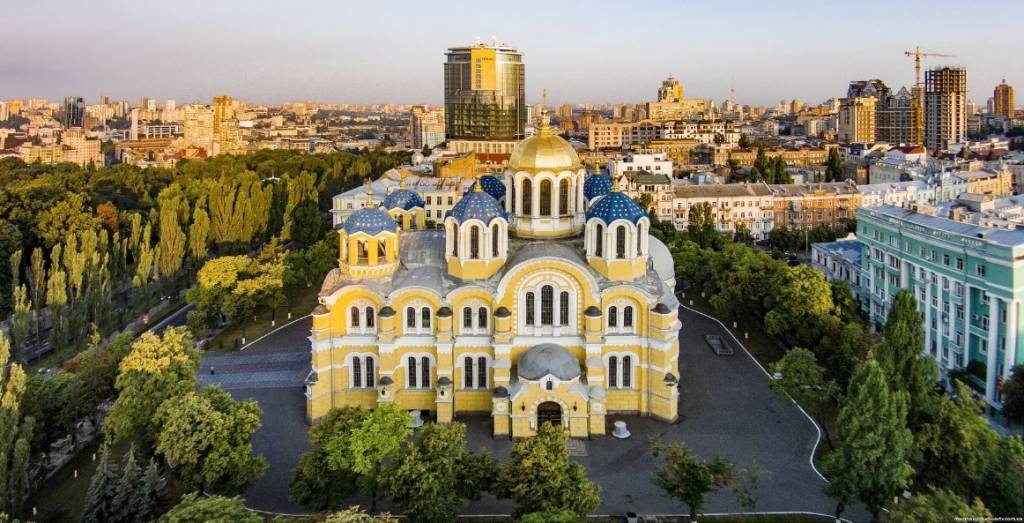
Why did he do it? Why did Vladimir Putin invade Ukraine? What is going on inside his head in these dark days? These questions accompany the great angst all over the world as the surreal battles rage in and around the cities of Ukraine. Whatever combination of reasons are flowing from Vladimir Putin’s thinking, the reality is we are seeing a terrible war with its attendant death and destruction and with the threat that it could spread. Our hearts go out to the people suffering, and we yearn for peace, for an end to senseless killing.
What can we do? The feeling of helplessness is palpable. To be sure we can pray. Not just as a kind gesture, but with all the grit and confidence we can muster from our faith that indeed prayer can be effective. Storm the heavens we must, with faith in God and that He is in charge.
For the believer – particularly the Catholic and the Orthodox – our prayer can invoke the intercession of the saints. And this brings us to the topic of this essay. One particular saint stands out as the best positioned go-to intercessor for peace in Ukraine. He lived and died in Kyiv: another Vladimir – St. Vladimir of Kyiv/Kiev. (I use the spellings derived from both Ukrainian and Russian because he transcends them.) Here is his story:
Vladimir was born into the ruling line in the Kyiv area in about 958. Like his father, he was pagan, and he was a ruthless warrior who fought with his siblings for control of the realm. He fled to Norway when he was vulnerable, recruited Viking warriors, and returned with a vengeance, slaying enemies with abandon, including his own brother.
Vladimir succeeded in seizing the throne in Kyiv in 978. In a decade of pagan rule, he erected pagan shrines, expanded his realm by force, and collected over 800 concubines and several wives. None of these exploits contributed to the label of “St.” which he now has.
Around the year 988, Vladimir converted to Christianity. His conversion is one of very few in history of a major figure who was already well advanced in a non-Christian life. Details of his conversion vary and are sketchy at best. In one version, he became unsettled at the pagan state of his realm and sent out emissaries to report on various religions. To his sensibilities, he found flaws in Islam (they banned alcohol), Judaism (they had lost Jerusalem), and Western Christianity (their churches were uninspiring), but embraced Byzantine Christianity with its beauty of liturgy and its magnificent church of Hagia Sophia. In another version, Vladimir agreed to assist the Byzantine emperor Basil put down a revolt, and in the process became enamored of Basil’s beautiful sister, Anna. In return for the hand of cultured Byzantine royalty in marriage (a near absurdity for a pagan barbarian – think Beauty and the Beast) Vladimir agreed to be baptized.
What at first must have been a conversion of convenience, became genuine. The waters of baptism did their work, and a repentant and changed Vladimir embarked upon nearly three decades of living the faith in charity and building Christianity in his realm – the area of the “Kievan Rus” people, which encompassed parts of today’s Ukraine, Belarus, and Russia. He dismantled the pagan shrines, sent away his former wives, built numerous churches, and established peace with neighboring realms. After his wife Anna died, he married the granddaughter of Holy Roman Emperor Otto, thereby linking him with both eastern and western Christianity, which, despite their differences, still comprised one Christian church. (The Great Schism came decades later). Vladimir died in 1015, trying to fight off pagan sons from his pre-Christian days.
Along with his gifted and spirited grandmother, St. Olga – also a convert to Christianity (about the time of Vladimir’s birth) – Vladimir is rightly credited with establishing Christianity among these Slavic, Kievan Rus peoples, at a time before various cultural and national groups evolved from them. Today, Russians, Ukrainians, and Belarussians all rightly claim St. Vladimir as their own – because he belongs to all of them. He is a saint in both the Orthodox and Catholic churches, and his feast day is July 15th. St. Volodymyr’s Cathedral in Kyiv is one of numerous churches in both Ukraine and Russia dedicated to him.

St. Vladimir’s Cathedral, Kyiv
Time proved that Vladimir’s conversion was authentic, but we do not know all the factors which changed his heart. Certainly his grandmother St. Olga, who planted the first seeds of faith in the realm, was influential, but she died when he was about eleven. It is likely that his wife Anna fostered his faith as well. The impact of the grace of Baptism and God’s Providence cannot be underestimated. And undoubtedly, in the obscurity of history, many Christians had prayed earnestly for Vladimir’s conversion. Those prayers were heard, and can inspire us today.
What better intercessor for peace in Ukraine and for the conversion of his namesake, Vladimir Putin, than this extraordinary convert from the Kievan Rus peoples. Just as, 1,000 years ago, a war-like Vladimir came to know the Lord and established peace in his land, so we can harbor genuine hope that the same can happen to today’s Vladimir as well. St Vladimir, pray for us. Pray for a change of heart for your namesake. Pray for peace in your homeland.

3 Comments
Beautiful!
Thank you!
Thank you for this interesting, informative read! He is definitely a good intercessory saint for the intention of Putin to have a change of heart.
Add Comment